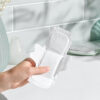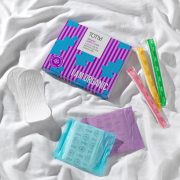The more women we speak to, the more firmly we believe greater transparency is needed in the femcare industry. We wanted to conduct a survey on a wider scale to understand more clearly just how much women know about the products they’re putting inside them every month and the results were quite shocking.
Here’s what we found from speaking to more than 650 women.
84% of women weren’t sure what mainstream tampons are made of, with almost 20% stating they had ‘no idea’. But of the 16% who claimed to know, many were misinformed. Of course, though, how can we be expected to know, when current legislation doesn’t force manufacturers to list the ingredients that are used in the manufacture of their products?
Unsurprisingly, 99% of the women asked felt it was important that tampons manufacturers should list their ingredients.
When asked ‘did you know that some mainstream brands contain chemicals and synthetic fibres, which some women are unknowingly allergic to?’, we were surprised to see that over half of the women surveyed (55%) answered ‘yes’. This is a real concern as it suggests a lack of importance placed on the effects femcare products could have on their health as they continue to use the products in question. Given the emphasis society places on eating healthily and using toxic free skincare products, it’s a wonder why this hasn’t yet fully extended to the feminine hygiene brands we choose.
Of the 45% who answered ‘no’ some of the anecdotal comments here were of real shock. After all, discovering your ‘trusty’ tampon brand, which you’ve used since your teens, could actually contain chemicals, is a pretty nasty surprise.
A whopping 93% of respondents thought more women should be aware of the fact a recent independent study found traces of chemicals classified as “probably carcinogenic” (cancer-causing) by The World Health Organisation in 85% of personal care and feminine hygiene products in supermarkets. We agree and will be working tirelessly in 2017 to make sure this is something which ALL women are aware of.
On the topic of menstrual health, 94% of women felt there was not enough education available and many of those whom we asked in person, who felt there was, couldn’t actually remember ever having been taught about it, when put on the spot. Other than the biological side of periods, were you given menstrual health education at school or elsewhere?
And finally, over 96% of the women asked said they would be happy to pay more for a product if they knew it was safer, better for their health and more environmentally sustainable. The fact is, organic cotton is more expensive to produce than man-made materials, such as rayon and plastics, but when the difference in price per tampon is a matter of pence, we think it’s an easy choice to make.
If you’re ready to make the switch to organic cotton tampons, shop here.





